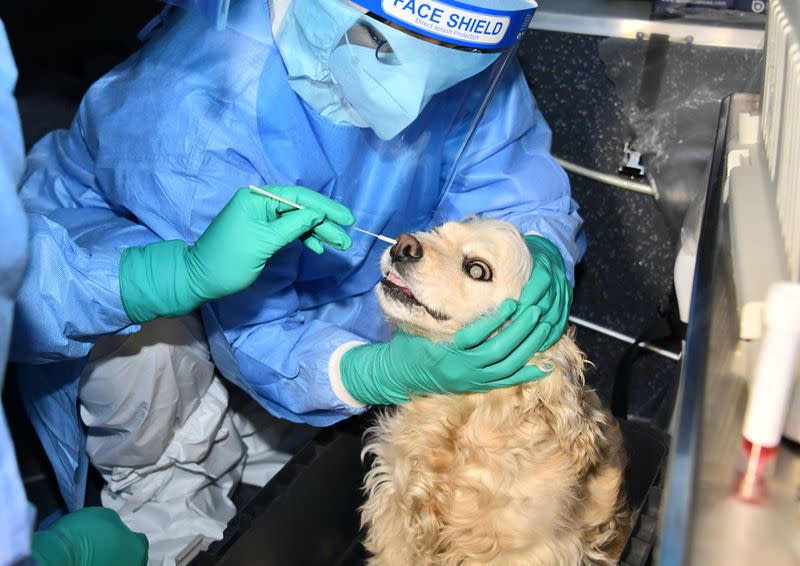By Nancy Lapid
(Reuters) – The following is a summary of some of the latest scientific studies on the new coronavirus and efforts to find treatments and vaccines for COVID-19, the disease caused by the virus.
UK variant can make pets very sick
The coronavirus variant first identified in the UK, known as B.1.1.7, has been linked to serious cases of heart disease in pets that appear to have contracted the infection in their humans, veterinarians report near London. The original strain of the virus did not appear to cause serious illness in pets. But between mid-December and February, reflecting the emergence and spread of B.1.1.7, veterinarians noticed a sudden increase in dogs and cats with myocarditis, a severe inflammation of the heart. In an article published on Thursday in bioRxiv before the peer review, they describe 11 animals that suddenly became seriously ill. Two cats and a dog immediately tested positive for B.1.1.7; two other cats and a dog later tested positive for antibodies. Many owners of these affected pets had a recent history of confirmed COVID-19. Myocarditis in pets remains rare, and in all of these cases, it appears that infections have been transmitted from people to pets, and not vice versa, said co-author Dr. Luca Ferasin of the Ralph Veterinary Center in Marlow , Buckinghamshire. “Our dogs and cats have achieved remarkable clinical improvement after a few days in intensive care,” he said. People concerned about their pets’ health should contact their veterinarian, he added. (https://bit.ly/3tJrNHo)
China’s COVID-19 vaccine appears safe in children
Sinovac Biotech’s COVID-19 vaccine appears to be safe and capable of triggering immune responses among children and adolescents aged 3 to 17, the company said on Monday. Data from early and intermediate stage studies involving 500 participants compared the medium and low doses of the vaccine with those of a placebo. Most of the adverse reactions were mild, said Zeng Gang, a researcher at the company, at an academic conference in Beijing. The levels of antibodies triggered by Sinovac’s CoronaVac were higher than those seen in adults in previous clinical tests of the injection, said Zeng. The effectiveness of CoronaVac in adults was less compared to data from trials with other available vaccines. The company is also testing a third booster dose for adults in a clinical trial in China, with participants receiving a third dose about eight months after receiving the second. Preliminary data on children have not yet been formally released. (https://reut.rs/3lGZeHS)
Blockages linked to “substantial” weight gain
Substantial weight gain is a clinically relevant effect of coronavirus blocks, a new study suggests. Researchers in the Health eHeart Study followed 269 adults from 37 US states and the District of Columbia who volunteered to report the weight measurements of their Bluetooth-connected smart scales. Approximately half were men, 77% were white and the average age was 52 years old. After the on-site shelter regulations took effect, participants gained weight “continuously”, regardless of their health or where they lived, according to a report published in Open on Monday on the JAMA Network. On average, they gained 0.27 kg (9.52 oz) every 10 days, or about 0.7 kg (1.54 pounds) per month. The researchers recognized that people who have Bluetooth-connected scales may not be representative of the general population. “It is important to recognize the unwanted health consequences that the local shelter can have at the population level,” they said. “The … data demonstrates the need to identify simultaneous strategies to mitigate weight gain, such as encouraging healthy diets and exploring ways to improve physical activity, as local governments consider new restrictions in response to SARS-CoV -2 and potential future pandemics. “(Https://bit.ly/3tIR2th)
Stroke rate less than 1% among US COVID-19 patients
During the first nine months of the coronavirus pandemic in the United States, less than 1% of patients hospitalized with COVID-19 suffered strokes related to blood clots in the brain arteries, new research shows. Among 21,073 hospitalized patients from March to November, 160 suffered ischemic strokes, for an overall risk of about 0.75%, according to research presented by Dr. Saate Shakil of the University of Washington in Seattle on Friday at the American Stroke Association International Stroke Conference. The data, collected by the American Heart Association, showed that those who suffered a stroke were older, more often male and more likely to have medical conditions known to increase the risk of stroke. Racial disparities were also evident, with black non-Hispanic patients at higher risk than white Hispanic and non-Hispanic patients. At the beginning of the pandemic, the rate of ischemic stroke in patients with COVID-19 was higher, with reported rates ranging from 0.9% to 2.0%, Shakil noted, and many younger patients with COVID-19 were affected. As a result, the World Health Organization, the US National Institutes of Health and other major health organizations have issued guidelines calling for the routine use of anticoagulants to prevent clots and strokes in adults hospitalized by COVID-19. (https://bit.ly/313HnkI)
Open https://tmsnrt.rs/3c7R3Bl in an external browser to get a graph of Reuters about vaccines under development.
(Reporting by Nancy Lapid; additional reporting by Rosanne Liu, Ryan Woo and Megan Brooks; Editing by Bill Berkrot)
